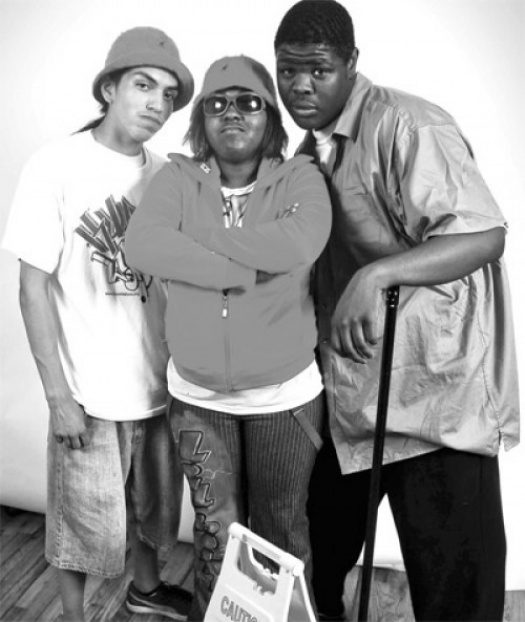
The Steppenwolf Theatre Company asked hip hop theater group, Kuumba Lynx, to describe their picture of America. On May 22 the urban storytellers will. Combining theater with graffiti, spoken word, beatboxing, footworking and breakdancing, the young men an
They are concerned about being victims of gang violence,” Jaquanda Villegas, Kuumba Lynx’s cofounder, said of residents in neighborhoods that are subjects of the presentation. Less frequent, but also present, are tales of joy. “We talk about how we celebrate, and how we come together,” said Jacinda Bullie, another of the group’s founder.
Villegas, Bullie and Leida Garcia formed Kuumba Lynx in 1996 in response to cuts in Chicago Public Schools arts funding. The women, teenagers at the time, said they wanted their voices to be heard. “Basically youth did not have a platform to speak about what was affecting them in their communities. And it’s important that they tell their stories, because if they do, somebody else absolutely will, and it will be fabricated,” Villegas said.
Mainstream media and commercialized hip hop are among those that step in and negatively caricature minority youth in the absence of authentic voices, Bullie said. “I’ve heard people say, ‘We need to take all of them and put them in Iraq, because they’re killing each other anyway.’ That’s obviously when you’re disconnected from a young boy that’s standing on the corner,” she said. “That’s the perspective of your average person who reads the newspaper or who watches the news. There are a lot of media outlets preventing stories from being told from the perspective of those who have been impacted by the reality.”
Kuumba Lynx draws youth, ranging in age from 8-32, from across the city, and the 22-member ensemble is now in its twelfth year. Also in its twelfth year is the Steppenwolf Theater’s Traffic Series, which invites artists who challenge the common understanding of the American experience. Kuumba Lynx is part of the series.
“Traffic provides the opportunity for Steppenwolf to be a place where people come together for an experience that bridges entertainment and discovery, the familiar and the unknown,” said Sylvia Ewing, the series’ director. But why use hip hop, an art form already associated with so many negatives, to educate? “You have to think about how hip hop evolved. It was during the 70s in the Bronx, when gentrification and social ills were part of the community.
So hip hop was a form of resistance,” Bullie said. “Hip hop is for everyone that recognizes that we’re not in a place that’s right in America. For everyone that recognizes the oppressive history of America, the imperialism of the politics of America, and wants to change that.”
Among those excused from service was a woman who produced the first look of concern from Kelly since jury questioning started May 9. The middle-aged woman said she saw a snippet of the scandalous videotape on the news and formed her own opinion, “Anyone who would become accused or be in that position of doing that supposedly with a child isn’t very smart. He needs help,” she said before stating that she would be able to give him a fair trail. Caught off guard, Kelly paused from writing on yellow index cards or post-it notes in his lap and gave a faint look as if he was hit in his stomach. Prosecutors made a failed attempt to select a juror that said if she was the singer, she would not want herself on the jury. The mother of a 16-year-old girl said that in addition to being a parent she is also a teacher, making it hard for her to be fair considering the nature of the charges against Kelly. “I’ll be honest. I work with children and part of my job is to keep them safe,” said the white woman in her 50s that describes herself as an “expert” juror. She has served as a juror on four civil cases in three states and one criminal case in New Mexico. Cook County Circuit Court Judge Vincent Gaughn asked if she could base her decision solely based on the evidence presented in court. She said, “I would hope so and that’s the best I can give you.” Ed Genson, one of Kelly’s lawyers grilled the woman about her frequent hesitations about giving his client the benefit of the doubt. He asked that while she said she hopes she can be fair, will she. “My best is that I hope I can,” the woman said. Not satisfied, Genson then asked, “If you were in Mr. Kelly’s position, would you want someone with your state of mind on the jury?” “Probably not,” she said. When the judge asked if she could look at Kelly and promise to give him a fair trial, she hesitated and said, “Yes, I think so.” Kelly, dressed in a navy suit, smirked and lowered his head. Others not chosen include several for health reasons and some who simply said they already found him guilty. The R&B superstar has pleaded not guilty to charges alleging he videotaped himself having sex with a girl in her early teens. He could face up to 15 years in prison if convicted. ______ Copyright 2008 Chicago Defender. All rights reserved. This material may not be published, broadcast, rewritten, or redistributed.

